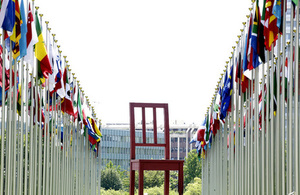Human Rights Council 39: Statement on the prevention of genocide
Statement delivered to the UN Special Rapporteur on Truth, Justice & Reparation and the UN Special Advisor on the Convention on the Prevention of Genocide

Thank you,
The United Kingdom thanks the Special Rapporteur and the Special Advisor for their presentations. We would like to address our remarks to the Special Advisor.
Mr Dieng,
The Convention on the Prevention and Punishment of the Crime of Genocide was drafted following the dark days of the Second World War.
On the Convention’s 70th anniversary, we continue to see immense human suffering around the globe. Conflict and persecution have led to millions of people being forcibly displaced, becoming refugees or left stateless. Conflicts are becoming more complex and protracted in nature.
States have the primary responsibility to protect their populations from mass atrocities. 149 States have ratified the Convention but 45 have yet to do so. We encourage those States to do so before the anniversary of its adoption on 9 December.
Where States fail in their responsibility to prevent and punish genocide, or other atrocity crimes, the international community has an important role to play.
The UK supports efforts to address the root causes of conflict, through tackling corruption, promoting good governance, building inclusive societies, supporting the rule of law, and enabling judicial and security sector reform.
Support for international criminal justice remains a UK priority. We provide assistance to judicial and investigatory mechanisms around the globe. In doing so, we strive to end impunity and deter future atrocities by holding perpetrators to account and achieving justice for victims.
Mr Dieng,
Mediation plays a key role in helping to prevent conflict and mass atrocities. We would welcome your views on how Member States can support the UN in its role in leading mediation efforts.
Thank you.